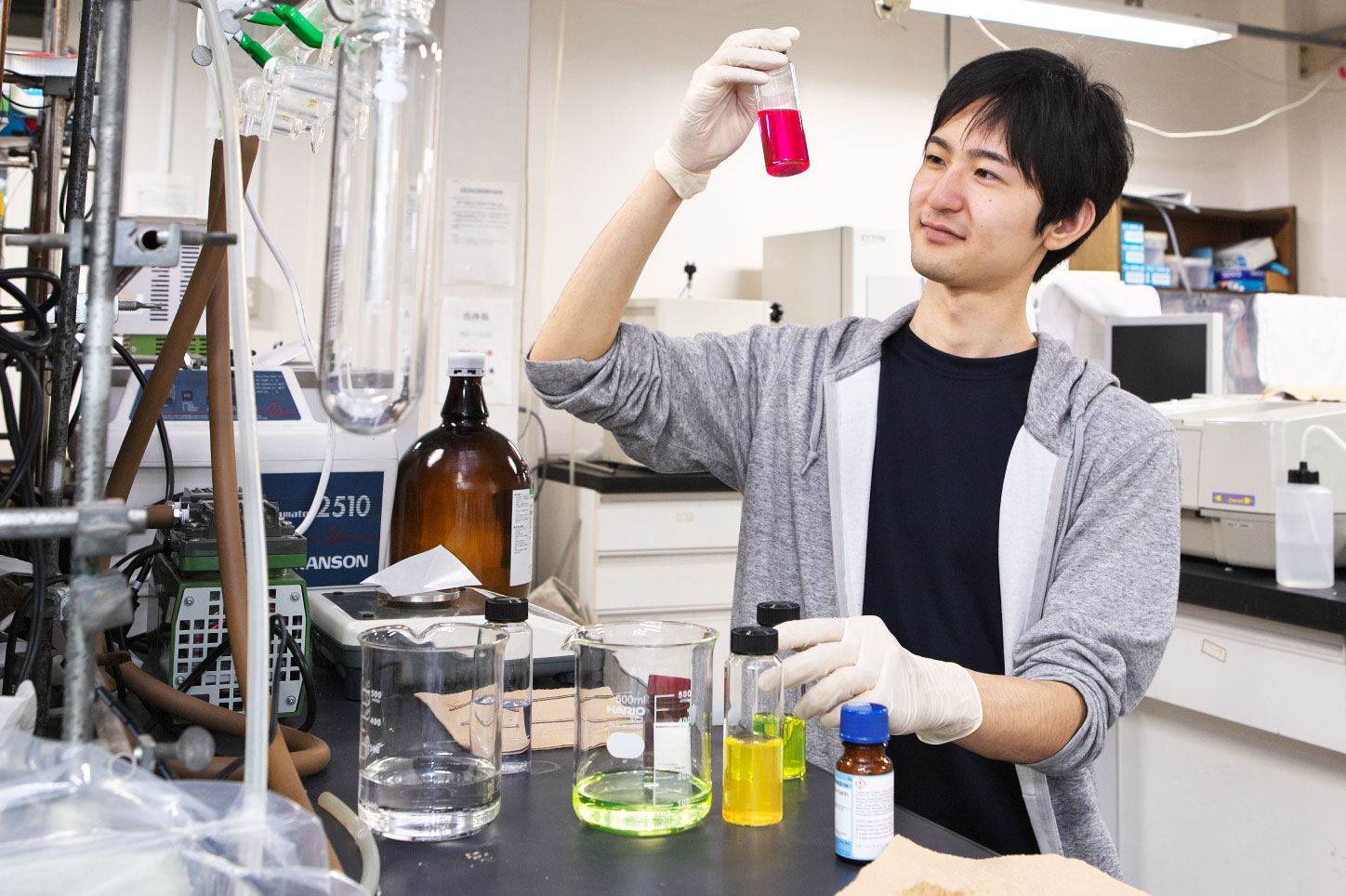Prospective Students
About DPOME

Prospective Students

Home > Prospective Students > About DPOME

We educate specialists in polymeric and organic materials well-versed in cutting-edge technologies for organic light-emitting diode displays and fuel cells, for aviation and space, and for medicine and social welfare.
Polymeric and organic materials are one of the three major categories of materials, along with metals and ceramics. Further accumulation and deepening of knowledge about polymeric and organic materials that supporting Japan’s strength in material development and manufacturing industries is becoming increasingly important. Hence engineers with practical expertise in the development of associated technologies and products are in great demand.
Accumulating further expertise and deepening existing expertise in polymeric and organic materials to promote material development and manufacturing industry growth is becoming increasingly important.
Our department aims to educate individuals to be open minded and possess sound values that are informed by a broad perspective and deep knowledge in polymeric and organic materials engineering. As self-motivated hands-on engineers, we hope that such individuals can contribute to the prosperity of society by creating new science and technology and even new industries.
From physics to chemistry and biology, and from fundamentals to applications, the department offers comprehensive education in polymeric and organic materials. The department can trace its origin to the textiles department (dyeing and weaving) of the Yonezawa Higher Technical School. Yonezawa Higher Technical School, the predecessor to the Faculty of Engineering, Yamagata University, was founded in 1910. Here, for the first time in Japan, rayon was successfully produced in 1913. From these early days to the present day, the department has been imbued with the spirit of contributing to foundational technologies and industries in polymeric and organic materials engineering.
In collaboration with several research institutions established by the University since 2011, the department functions as a global research hub for engineering and technology with organic electronics and related fields at its core. The department is globally acclaimed in several other areas: foundational technologies such as polymer synthesis and characterization, polymer mechanics and rheology, and polymer processing, and applications such as rice bread and biomaterials.
Graduates of this department who have earned the required credits can acquire a High School Teacher Type 1 License (Industry).
It is no exaggeration to say that the fundamental characteristics of polymeric and organic materials are determined by the basic structure of each molecule (referred to as the molecular structure, primary structure or nanostructure) and higher order structures related to molecular assembly (referred to as the intermediate structure, secondary or tertiary structure, mesostructure). In addition, to create products equipped with the functions demanded by society and industry, advanced processing technologies, novel material combinations and systematizations (macroengineering) are also very important.
The department focuses on the education of engineers and specialists whose creativity and pragmatism are grounded on deep scientific scholarship. This is accomplished through tight integration of teaching and research, all the way from the molecular level fundamentals of polymeric and organic materials up to practical applications and products. The department aims to train students to have wide interests and a global perspective. Building on this foundation, students should be able to logically and rationally analyze and understand the current industrial situation both locally and nationally. They also must be sufficiently self-motivated to launch novel initiatives based on the developed understanding.
In the first year, students of this department will be educated mainly in mathematics and physics, which form the foundations and the fundamentals of their academic discipline, in addition to liberal arts education. In the second year, besides further education in mathematics and physics, subjects closely related to their academic discipline, such as organic chemistry and physical chemistry; introductions to polymer synthesis, photonic and electronic materials and physical engineering; structure analysis; courses from other departments; and English, allow students to acquire the technical knowledge expected from every student of the department. From the third year, students specialize in one of three areas: synthetic chemistry, photonic and electronic materials, and physical engineering; and delve deeper into their particular area of specialization in small groups. In addition, from the second half of the third year, students will be affiliated with a research laboratory and continue their education in small groups through seminars and experiments, and through project-based learning by performing supervised research. Through these means, the department aims to train engineers who are experts in the practical application of their knowledge.
From the third year, students specialize in one of three areas: synthetic chemistry, photonic and electronic materials, and physical engineering, and delve deeper into their area of specialization but now in small groups. For further information, see the specializations page.
From the second year, students conduct experiments in physics and chemistry that form the foundation for a study of the science of polymeric and organic materials. From the third year, they shall perform experiments according to their individual specialization.
From the second half of the third year, each student will be affiliated with a research laboratory. To prepare for research leading to graduation, a “Research development proposal” is mandatory. Its purpose is to improve the student’s experimental skills by exposing them to state-of-the-art research at an early stage. Furthermore, through laboratory seminars and discussions, their communication skills and their ability to become contributing members of society are developed. Finally, this early exposure is expected to smoothly lead to their research project. For detailed information about research, please refer to the web pages of the individual laboratories.
During the whole of the fourth year, each student engages in cutting-edge research on their individual research project at their affiliated laboratory. During their research presentations, the research results will be evaluated both on their specific subject expertise and on the fundamentals. At the same time, their presentation skills and communication skills will also be evaluated. In this faculty, more than 60% of the graduated students progress to the Master’s program and engage in more advanced research.